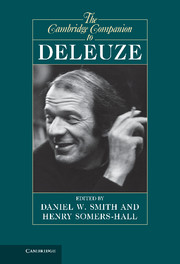Book contents
- Frontmatter
- Contents
- Contributors
- Abbreviations
- Introduction
- 1 Deleuze and the history of philosophy
- 2 Difference and Repetition
- 3 The Deleuzian reversal of Platonism
- 4 Deleuze and Kant
- 5 Phenomenology and metaphysics, and chaos
- 6 Deleuze and structuralism
- 7 Deleuze and Guattari
- 8 Nomadic ethics
- 9 Deleuze’s political philosophy
- 10 Deleuze, mathematics, and realist ontology
- 11 Deleuze and life
- 12 Deleuze’s aesthetics of sensation
- 13 Deleuze and literature
- 14 Deleuze and psychoanalysis
- 15 Deleuze’s philosophical heritage
- Bibliography
- Index
- References
2 - Difference and Repetition
Published online by Cambridge University Press: 05 December 2012
- Frontmatter
- Contents
- Contributors
- Abbreviations
- Introduction
- 1 Deleuze and the history of philosophy
- 2 Difference and Repetition
- 3 The Deleuzian reversal of Platonism
- 4 Deleuze and Kant
- 5 Phenomenology and metaphysics, and chaos
- 6 Deleuze and structuralism
- 7 Deleuze and Guattari
- 8 Nomadic ethics
- 9 Deleuze’s political philosophy
- 10 Deleuze, mathematics, and realist ontology
- 11 Deleuze and life
- 12 Deleuze’s aesthetics of sensation
- 13 Deleuze and literature
- 14 Deleuze and psychoanalysis
- 15 Deleuze’s philosophical heritage
- Bibliography
- Index
- References
Summary
DIFFERENCE AND REPETITION AS TRANSCENDENTAL EMPIRICISM
Press send
You know you want to …
Gilles Deleuze’s Difference and Repetition is at the center of his philosophical works, not only chronologically but also methodologically and in terms of interpretation. This does not mean it is his most important book. This depends on the problems and questions driving any given reading. Political studies are more likely to focus on the later collaborations with Félix Guattari. Interpretations more interested in art will be drawn first to Proust and Signs or to the book on Francis Bacon, The Logic of Sensation. More pure philosophical enquiry does not have to start with Difference and Repetition, since The Logic of Sense is the better starting point for the study of Deleuze’s philosophies of language and of the event.
Close reflection on the history of philosophy or on Deleuze’s ontology need not emphasize the difference book, since works such as Nietzsche and Philosophy and The Fold: Leibniz and the Baroque offer more comprehensive accounts of Deleuze’s version of those authors and, for instance, his concepts of world or creation. Nonetheless, as a reading goes deeper into any of these areas, extensive reference to Difference and Repetition will prove necessary. It is the keystone to Deleuze’s philosophy, but as we shall see, even the notion of such a secure foundation is challenged in the book.
- Type
- Chapter
- Information
- The Cambridge Companion to Deleuze , pp. 33 - 54Publisher: Cambridge University PressPrint publication year: 2012
References
- 7
- Cited by



